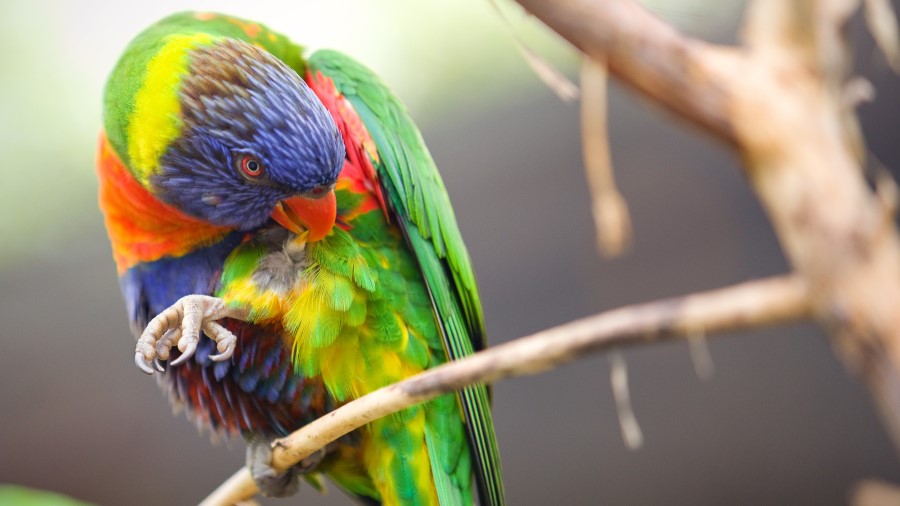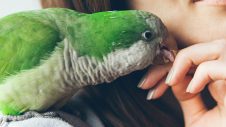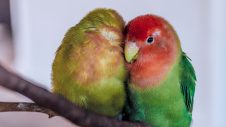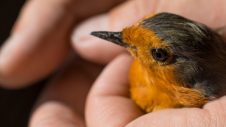Pet birds can lose feathers for a number of reasons. Common problems include moulting (either normal or abnormal), stress (many causes), feather destructive behaviour, excessive preening by a parent or cage mate and viral or bacterial infections.
Losing Feathers Through Moulting
All normal birds go through a moult around once a year, but this can vary, especially for birds kept indoors where day light hours are irregular. If feathers are almost ready to moult and the bird is frightened or stressed, feathers can fall out precipitously leaving bare patches before new feathers get a chance to grow in. In these cases, just being patient and ensuring your bird is getting good nutrition and vitamins may be all that is needed to resolve the feather loss.

Losing Feathers Through Stress
Stress can lead to feather destructive behaviour where the bird itself starts plucking feathers that may, or may not, be ready to moult. Some examples of situations that may make a bird feel stressed include, where a dominant bird is intimidating a cage mate there has been changes to the bird’s normal routine/household, mental and physical stimulation needs not being fulfilled or the environment and dietary conditions are inadequate. One African Grey Parrot that came into a clinic pulled all of his body feathers out in 24 hours when a new boyfriend moved in with his owner. They gradually grew back in once the bird became adjusted to the new status quo.
The best approach is to work out what is causing the stress and to change the environmental circumstances to minimise it. This can be challenging. Often it can be the relationship between the owner and the bird that is the source of stress triggering feather plucking. Parrots, especially, can pair bond with their owners and become frustrated when their ‘mate’ doesn’t want to mate, nest or lay eggs. These birds will typically feather pick across their chest, but it could be anywhere. It’s best to avoid stroking your parrot on the back as this can trigger sex hormone release and can exacerbate the problem. Remember, ‘best friend, not mate’.
Parent birds will sometimes over-preen their youngsters, especially if they are keen to lay a second clutch of eggs. These babies will have bare patches on their back and neck where the parents can easily reach. Birds can also over-preen their partners, usually on the back of the head or neck. Separating the birds will solve the problem or you could initially try additional mental stimulation through activities and toys to help distract them more and reduce this behaviour.
Losing Feathers Through Viruses & Bacteria
Viruses and bacteria can cause feather loss in some pet birds. Circovirus, which can cause loss of feathers on the head as well as elsewhere on the body and wings, is common in wild cockatoos. It is the same virus that causes ‘runner’ budgies and feather damage in a range of other species. Polyomavirus is another virus sometimes associated with feather loss. Skin infections from bacteria or yeasts can also lead to feather damage and bare patches on birds’ skin.
Whatever the initial cause, if there is permanent damage to the feather follicle, birds may not regrow feathers even though the initial reason for the feather damage has passed. To ensure the best chance for feather regrowth, it is always a good idea to have pet birds with feather loss checked by a veterinarian as soon as the problem is noticed. While there are many different causes for the problem, only some of which have been mentioned here and not all are treatable, early intervention will provide the best chance for resolution of the problem.
Your local Greencross Vets can check for a broad range of viral, bacterial and fungal infections that may be behind your bird’s plucking habit. Call ahead and make an appointment.
Bird Losing Feathers FAQs
Why do birds lose feathers?
Birds lose feathers for a variety of reasons, including moulting season where they need to replace old feathers that have broken down after some time of wear and tear, as a result of bacteria or an infection or sometimes stress.
Why is my bird losing feathers around his/her neck?
If your bird is losing feathers in a localised area, it may be due to some sort of irritation or infection affecting that specific region, resulting in feather loss. Skin infections for example can cause feather damage and bare patches which you may notice when your bird moves or turns their head. If you have multiple birds, the bare patches on their neck may be due to the other bird over preening them, resulting in bare patches from too many feathers being plucked.
Why is my bird losing feathers on his/her head?
Feather loss on a bird’s head could point to a few possibilities. It could be an abnormal malt, indicative of ringworms or some other parasite or infection, over-preening by a parent or mate as well as a vitamin A deficiency. If you are concerned about your bird losing feathers on its head and want to understand why, it is best to contact your local Greencross Vets team so your bird can be assessed for any underlying conditions.
What happens when a bird loses its tail feathers?
If your bird loses its tail feathers, they will typically grow back quickly. Often a part of moulting, if your bird’s tail feathers are pulled out you generally don’t need to worry. Oftentimes birds can adjust to fly without them until the new ones have grown back in.
Why is my bird scaly and losing feathers?
If you notice your bird has scaly or flaky skin and is also losing feathers in that area, this is generally an indication something abnormal is going on. Common causes of scaly skin and feather loss are scaly leg mites which cause skin infections, or ringworm. If you notice your bird has flaky or scaly skin, you should contact your vet and organise an appointment so they can determine what the health issue is that’s causing the skin abnormalities and additional feather loss.

 Greencross Vets
Greencross Vets 








